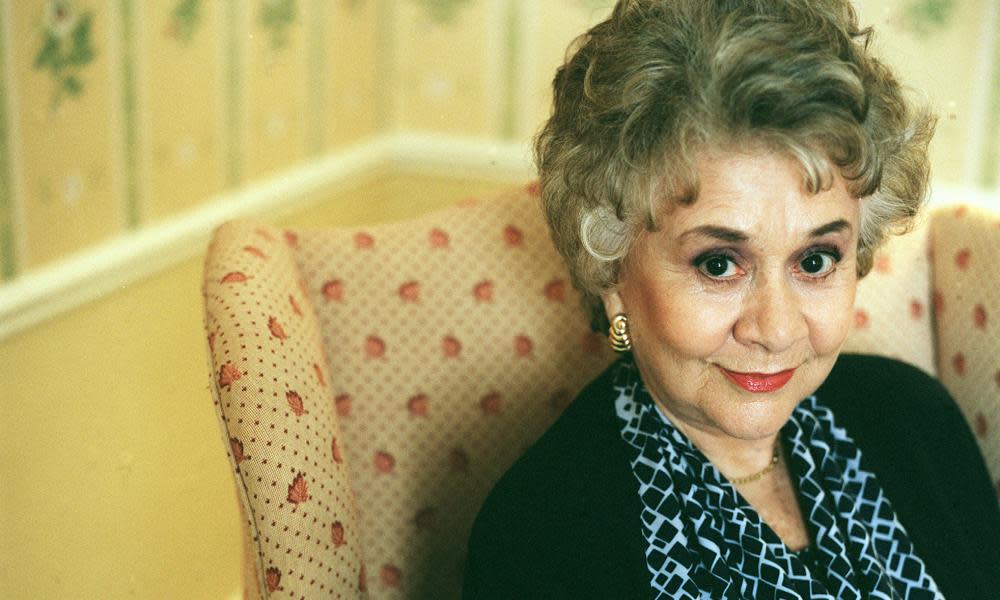Joan Plowright at 90: the star who spoke truth to British theatre

Joan Plowright, who celebrates her 90th birthday today, is the senior figure in a remarkable generation of actors including Judi Dench, Maggie Smith and Eileen Atkins, all celebrated in the film Nothing Like a Dame. Her marriage to Laurence Olivier inevitably made her part of showbiz aristocracy but Plowright brought to British theatre a quality of earthiness and emotional directness shared by near-contemporaries such as Albert Finney, Peter O’Toole and Billie Whitelaw. As the daughter of a Lincolnshire newspaper editor, she could hardly be called working-class yet she was part of a movement that helped British theatre shed its aura of evasive gentility.
You could, for the sake of convenience, divide Plowright’s working life into three phases: her Royal Court period, her National Theatre years and her post-National freelance career.
Rather than catalogue her performances, I would pick out three that illustrate her capacity to give us the unvarnished truth. She came to prominence in the Royal Court of the 1950s but, although I missed her in The Country Wife and the double bill of Ionesco’s The Chairs and The Lesson, where she played a wizened crone and a preyed-on pupil, I did catch her as Beatie Bryant in Arnold Wesker’s Roots – which quickly became a landmark in postwar drama.
The point about Beatie is that she is the daughter of Norfolk farmworkers who, on returning home, first parrots the opinions of her London boyfriend and then, when he fails to turn up, discovers her own voice. Wesker’s play is part of a long line, harking back to Shaw’s Pygmalion and anticipating Willy Russell’s Educating Rita, about female self-realisation. Everyone who saw it remembers the ecstasy that illumined Plowright’s features as she realised she was at last speaking, and thinking, for herself. But Plowright caught no less well Beatie’s potential for joy in the scene where she danced round the stage as her mother clapped to the rhythmic excitement of Bizet’s suite from L’Arlésienne.
Olivier claimed to be “knocked off my feet by her performance”. By 1961 he and Plowright were married and she became a vital part of his inaugural Chichester Festival theatre seasons, which provided a launchpad for the National Theatre company. It can sometimes be tedious to bang on about old productions but anyone who wishes can still find on DVD Olivier’s Uncle Vanya which played at Chichester in 1962-63 and then at the Old Vic. It was one of the great Chekhov experiences of the 20th century, and Plowright’s performance as Sonya, hopelessly in love with Astrov (played by Olivier), was a model of stoic endurance in the face of unfulfilled passion.
The great moment comes at the play’s end when Sonya is left alone with her uncle to face a future of loveless toil. It would be easy to play Sonya’s final consoling speech sentimentally. Instead Plowright, looking at the desolate features of Michael Redgrave as Vanya, struck a note of almost buoyant optimism as she claimed: “When our time comes, we shall die without a murmur … we shall see a light that is bright and lovely and beautiful … we shall rest.” Plowright caught perfectly Sonya’s note of defiant faith in a way that brought tears to my eyes at the time, and that still does when I watch or listen to that performance.
Plowright went on to do many fine things at the National including a strong-willed Maggie in Hobson’s Choice, leading her chosen groom off to the marriage bed by his ears, a deeply sensual Masha in Three Sisters and a single-minded Portia in The Merchant of Venice who first preaches mercy and then displays a vindictive cruelty to Shylock. She was an integral part of the National company at the Old Vic, but the determination to avoid any sense of favouritism – and the fact that she had three young children to bring up – meant that her potential was not always fulfilled. I would love to have seen her play Cleopatra, Lady Macbeth, or Hedda Gabler.
After the National, however, Plowright achieved much. She did Shakespeare at Chichester, Chekhov in the West End, two fine plays by Eduardo di Filippo and enjoyed a late-blossoming film career often under the direction of Franco Zeffirelli. But, if I had to pick out one performance that revealed her unrivalled capacity for earthy truthfulness and emotional honesty, it would be that as Poncia in Nuria Espert’s production of Lorca’s The House of Bernarda Alba at the Lyric Hammersmith, and then the West End, in 1986. The character is the servant to the tyrannical heroine (played by Glenda Jackson). Everything about this performance was perfect, from the way Plowright evoked a lifetime of household drudgery, by smoothing the nap of folded linen, to the hint that she shared the same longing for life and gaiety as Bernarda Alba’s imprisoned daughters.
Related: Judi, Maggie, Joan and Eileen: all hail British theatre's great dames | Michael Billington
This is a quality that has characterised much of Plowright’s work: the ability to combine down-to-earth practicality and common sense with an irrepressible joie de vivre. From reading Plowright’s fascinating memoirs, And That’s Not All, you realise how much the National in its early years – and Olivier in particular – owed to her quiet wisdom. Looking back over her rich career is to be reminded of how much she has been a force for change in British acting.

 Yahoo News
Yahoo News 
